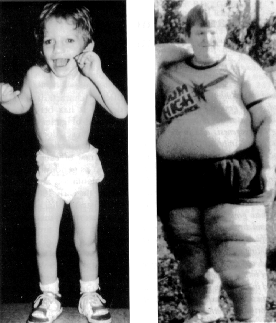Overview: Prader-Willi syndrome (PWS)
is a disorder caused by a deletion or disruption of genes in the proximal arm
of chromosome 15 or by maternal disomy in the proximal arm of chromosome 15.
 |
| Patient with Prader Willi Syndrome |
Phenotype/Characteristics and Diagnosis:
A diagnostic
criteria for Prader-Willi syndrome was made by Holm et al. Based on these
guidelines, the diagnosis of Prader-Willi syndrome is highly likely in children
younger than 3 years with 5 points (3 from major criteria) or in those older
than 3 years with 8 points (4 from major criteria).
·
Major
criteria (1 point each)
o
CNS -
Infantile central hypotonia
o
GI -
Infantile feeding problems and/or failure to thrive
o
Nutrition
- Rapid weight gain in children aged 1-6 years
o
Craniofacial
- Characteristic facial features such as narrow bifrontal diameter,
almond-shaped palpebral fissures, narrow nasal bridge, and down-turned mouth
o
Endocrine
- Hypogonadism
o
Developmental
- Developmental delay and/or mental retardation
·
Minor
criteria (one half point each)
o
Neurologic
- Decreased fetal movement and/or infantile lethargy
o
Pulmonary
- Sleep disturbance and/or sleep apnea
o
Endocrine
- Short stature for predicted height by mid adolescence
o
Dermatologic
- Hypopigmentation
o
Orthopedic
- Small hands and feet
o
Orthopedic
- Narrow hands with straight ulnar border
o
Ophthalmologic
– Esotropia and/or myopia
o
Dental
- Thick viscous saliva
o
Otolaryngology
- Speech articulation defects
o
Psychiatric
- Skin picking (Some patients with Prader-Willi syndrome have become anemic
from chronic rectal bleeding secondary to skin picking.)
·
Supportive
criteria (no points)
o
Neurology
- High pain threshold and normal neuromuscular evaluation for hypotonia
o
Gastroenterology
- Decreased vomiting
o
Endocrinology
- Ineffective thermoregulation, early adrenarche, and/or osteoporosis, adrenal
insufficiency
o
Orthopedics
– Scoliosis or kyphosis
o
Developmental
- Jigsaw puzzle proficiency
Frequency: Prader-Willi
syndrome affects an estimated 1 in 10,000 to 30,000 people worldwide. Differences in
prevalence rates between sexes have not been reported
Diagnosis:
Genetic testing is
employed for accurate diagnosis of the condition.
· Genetic
testing for Prader-Willi syndrome (PWS) includes chromosomal analysis and
assessment for methylation patterns in the Prader-Willi syndrome region.
· Methylation
patterns can be determined with Southern blot hybridization or polymerase chain
reaction (PCR) using DNA primers that can detect methylated cytosine.
· Analysis
for underlying uniparental disomy requires samples from both parents and the
child with Prader-Willi syndrome.
· Fluorescent
in situ hybridization (FISH) can be used to confirm prenatal diagnosis when a
deletion in the 15q region is suspected after chorionic villus sampling or
amniocentesis.
Causes:
· Prader-Willi
syndrome is due to the loss of the paternal copy of chromosome 15q11.2-13.
· Most
cases of Prader-Willi syndrome are sporadic. More than 70% of patients have a
deletion of the paternal copy; approximately 25% of patients with Prader-Willi
syndrome have maternal uniparental disomy in chromosome 15. The remainder of
patients with this disorder have a translocation or other structural alteration
in chromosome 15.
· Most
manifestations of Prader-Willi syndrome are attributable to hypothalamic
dysfunction.
Treatment/Recommendations/Therapies:
Patients with Prader-Willi
syndrome (PWS) frequently require medical care for the following:[37]
·
Initial
management of hypotonia or poor feeding
·
Evaluation
for hypogonadism or hypopituitarism
·
Management
of obesity
·
Monitoring
for scoliosis
·
Therapy
for behavioral issues
Patients with Prader-Willi syndrome may require surgical care
for treatment of complications of obesity, treatment of cryptorchidism, and
scoliosis intervention.
Tonsillectomy, adenoidectomy, or tracheostomy placement may
be required in patients with obstructive sleep apnea.
Biliopancreatic diversion and gastric bypass surgery have
been ineffective for long-term weight reduction. Patients with Prader-Willi
syndrome have hyperphagia and require restricted access to foods to minimize
weight gain. Binge-eating episodes may predispose patients to development of
food poisoning and acute gastric dilation. Caregivers of patients with
Prader-Willi syndrome should be instructed in the Heimlich maneuver.
Growth hormone therapy in patients with growth hormone
deficiency improves lean body mass and corrects osteopenia.
Patients with
Prader-Willi syndrome (PWS) may require inpatient evaluation and treatment for
hypotonia and poor feeding during infancy.
Individuals with
Prader-Willi syndrome and other medical issues, including scoliosis and
complications of obesity or pickwickian syndrome, may require inpatient therapy.
Patients with severe
behavioral problems may merit admission to a facility staffed with individuals
with long-term experience with Prader-Willi syndrome.
Support Groups:
Support - Prader-Willi Syndrome Association
http://www.pwsausa.org/support/
References:
A.D.A.M.Health Solutions, Ebix, Inc. (2012) Prader-Willi syndrome. NCBI. Retrieved March 12, 2013 from the URL: http://www.ncbi.nlm.nih.gov/pubmedhealth/PMH0002572/
Genetics Home Reference (2011). Prader
Willi Syndrome. Genetics Home reference. Retrieved March 12, 2013 from the URL:
http://ghr.nlm.nih.gov/condition/prader-willi-syndrome
Scheimann, A. (2012). Prader-Willi syndrome. Medscape
Reference. Retrieved March 12, 2013 from the URL: http://emedicine.medscape.com/article/947954-overview
Photo from:
http://schoolworkhelper.net/wp-content/uploads/2011/06/Prader-Willi-Syndrome-2.gif
Photo from:
http://schoolworkhelper.net/wp-content/uploads/2011/06/Prader-Willi-Syndrome-2.gif

Walang komento:
Mag-post ng isang Komento